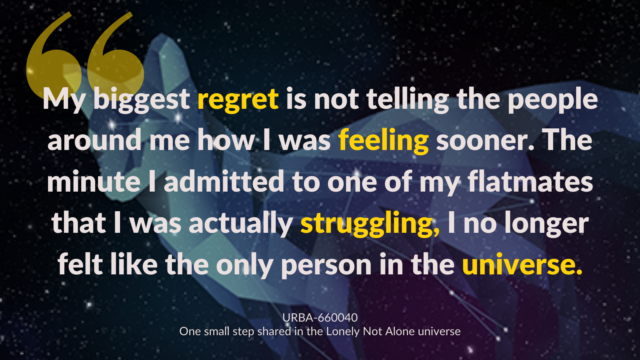Lonely Not Alone – We’re making a difference

Lonely Not Alone is a campaign that stirs up emotions for everyone involved. It starts with the lived experience of the young co-designers who develop our plans each year and runs through to the stories of the young people we reach.
It also impacts everyone at the Co-op Foundation and Effervescent who work together on the campaign. We occasionally do long hours, we agonise over every word we write on social media and we argue about what astronaut boots should look like (true story).
It takes a lot out of us and, as campaign professionals and human beings, it’s important to remember that we’re here to make a difference. Otherwise, why would be bother?
That’s why today, I’m so proud – and a touch emotional – to share our latest research* into the impact of Lonely Not Alone in 2021. Take a bow every young person who helped to build our campaign this year:
- 3.1m young people have now seen Lonely Not Alone and 97% of them have taken an action as a result
- Young people who’ve seen Lonely Not Alone are three times more likely to say they believe society is now taking youth loneliness seriously
- Seven out of 10 young people who recognise the campaign say they feel less alone in their loneliness after seeing it
- Young people who’ve seen Lonely Not Alone are almost 20% more likely to say they feel comfortable asking for help with their loneliness
Check out our website today to find out what our 2021 campaign is all about.
Three years in
I have a particular and very personal affection for Lonely Not Alone.
Believe it or not, it was the main question I was asked when I was interviewed for my job at the Co-op Foundation in early-2018 – ‘how would I run a campaign to tackle the stigma of youth loneliness?’
Once I had joined the Foundation for real, we got to work developing the idea with match funding from the Department for Digital, Culture, Media and Sport and creative input from nine amazing young co-designers. This all built on our Belong programme that was funding local youth loneliness projects and Co-op’s wider work with the British Red Cross.
Our co-design group developed our first concept against this open brief: Create any campaign that aligns to Co-op Foundation values and achieves these four outcomes:
- More young people become confident talking about loneliness
- More young people recognise society treats youth loneliness seriously
- More young people take actions that help tackle their own feelings of loneliness
- More young people help others when they feel lonely
From this acorn, Lonely Not Alone was born and yellow socks became our symbol of solidarity. For two years, we shared this message and asked everyone to help us build a world where young people knew it was safe to talk about loneliness with confidence.
Getting scientific
Awareness campaigns like ‘early’ Lonely Not Alone are amazing, but they can only go so far. Our outcomes are laden with attitude and behaviour change so earlier this year we developed our Theory of Change.
Step one of this journey was to be called our “connect” phase. It’s informed by Co-op Foundation research that found young people who felt lonely the most often were the most likely to self-stigmatise and that young people who felt lonely the least, were the least likely to help others.
‘Connect’ ran through 2021 and it aimed to help lonely young people feel less alone and to build understanding and empathy about what loneliness was like for us all.
A stellar new website
After much creative development (and some astronaut filming) we came to life in October as a new digital universe where young people could read and share the one small step they’ve taken to tackle loneliness.
To date, almost 150 incredible stories have been added to our site. They appear as fierce and shining stars in the darkness of space, connected with other stars of similar experiences. This is what our co-designers said loneliness felt like.
These stories are honest, brave, sometimes difficult to read, but often helpful. Many of them give advice about how to feel less lonely, which is more important than ever. According to our One Small Step research, there are 1.9m chronically lonely young people in the UK and 85% of these say it’s negatively impacting on their mental wellbeing.
Achievements and next steps
We were passionate about making progress against our outcomes this year, and thanks to our co-designers and the brave young people who’ve shared stories, we believe we’ve done that.
In addition to the stats I listed above, more than 40,000 people have visited our website in just two months and 71% of young people who’ve seen Lonely Not Alone agree loneliness is a normal emotion for people their age.
We’re aiming for this figure to reach 75% for all young people by 2025 and everything we’re reading today tells us we have a digital tool that’s starting to make a difference. We now just need to help every young person to benefit, too.
Look out early in 2022 for ways you can get involved in Lonely Not Alone. In the meantime, help young people you know by directing them to lonelynotalone.org. If you run a youth group, here’s a workshop pack that can help you encourage young people to talk about loneliness.
Good luck, thank you and speak soon.

* Unless otherwise stated, statistics used in this report refer to the Co-op Foundation / Opinium Lonely Not Alone survey November 2021. Fieldwork was completed by Opinium. Opinium surveyed a sample of 2,000 10 to 25-year-olds, representative of each age group (10 years, 11-12, 13-15, 16-18, 19-21, 22-25) living in the UK. Fieldwork was conducted between 15th and 23rd November 2021.
